Long ago, in the ancient lands of Persia, there lived a prince named Zahhak, whose destiny would lead him down a path of darkness and despair. What began as a story of innocence turned into one of the most feared legends in Iranian mythology, for Zahhak's tale is one of power, betrayal, and an insatiable hunger for control. This is the story of how Zahhak, the once noble prince, became the fearsome Serpent King, whose reign of terror spread across the lands, and whose name would be forever etched in history. Zahhak was born to Merdas, a kind and benevolent king who ruled over the lands with fairness and justice. The people of the kingdom loved and respected Merdas, and under his reign, the land flourished. Zahhak, however, was different from his father. He was ambitious, restless, and secretly harbored dreams of power and greatness that went beyond the realm he was destined to inherit. One fateful day, Zahhak encountered a mysterious figure who introduced himself as a cook. This man, however, was not an ordinary cook but the Devil himself, disguised to manipulate Zahhak’s fate. The Devil saw in Zahhak an opportunity to spread evil and chaos throughout the world. "If you follow me," whispered the Devil, "I will give you power beyond your imagination." Zahhak, tempted by the allure of ultimate power, listened to the Devil’s promises. Day by day, the cook ingratiated himself with Zahhak, preparing the most delicious and exquisite dishes the young prince had ever tasted. With each bite, Zahhak grew more fond of the mysterious cook, who one day asked, “Would you do anything to gain more power, even if it meant betraying those closest to you?” Zahhak paused, but the seed of greed had already been planted. He agreed, sealing his fate. The Devil instructed Zahhak to kill his own father to take over the kingdom. That very night, Zahhak pushed his father into a deep pit, and Merdas met his untimely death. Thus, Zahhak became the king, but this act of betrayal marked the beginning of his transformation into a creature of pure evil. Once Zahhak ascended to the throne, the Devil appeared again, this time in a different form, as an advisor. "You are now the king," he said, "but you are still not powerful enough. You must accept my gift if you wish to rule over all lands." Zahhak, blinded by ambition, agreed without question. The Devil kissed Zahhak on both shoulders, and from those very spots, two black serpents emerged, writhing and hissing with venom. Terrified, Zahhak tried to cut off the serpents, but they grew back instantly. In desperation, he asked the Devil how to rid himself of the curse. The Devil, now pleased with his work, said, “These serpents cannot be removed. They will demand to be fed, and you must feed them to keep them satisfied, or they will turn on you.” Zahhak’s fear turned to horror when he learned what the serpents desired – human brains. Every day, he had to sacrifice two men to feed the serpents, or they would bite him with their deadly fangs. Despite this gruesome requirement, Zahhak grew more powerful. His strength multiplied, and his influence spread across the lands, as fear of the Serpent King took hold in every heart. As Zahhak's power grew, so did his cruelty. He conquered neighboring kingdoms, enslaving their people and feeding them to the serpents that coiled around his body. The once fertile lands of Persia became barren under his reign, and a dark cloud hung over the kingdom as a symbol of Zahhak's tyranny. His palace, once a place of beauty, turned into a fortress of death and despair. People whispered tales of the Serpent King, of how he would steal the youth and sacrifice them to feed the monstrous serpents on his shoulders. Mothers hid their children, and fathers armed themselves, but Zahhak’s power seemed unstoppable. His kingdom spread far and wide, and he ruled with an iron fist, his name becoming synonymous with fear and death. But amidst this darkness, a glimmer of hope began to emerge. In a distant part of the kingdom, a wise and noble man named Kaveh, a blacksmith by trade, suffered a terrible loss. Zahhak’s soldiers had taken seventeen of his sons to feed the insatiable serpents, leaving only one son alive. Fueled by grief and anger, Kaveh vowed to fight against the tyrant and free the people from his monstrous rule. Kaveh took his son and marched into Zahhak’s palace, his heart ablaze with righteous fury. Before the throne of the Serpent King, he demanded justice. “You have taken my sons, my blood, my flesh! I have come to end your reign, Zahhak!” Zahhak laughed, but there was unease in his eyes. The Devil’s power had shielded him from harm, but he had not anticipated the wrath of a father who had lost everything. Kaveh tore off his leather apron and held it high, declaring it a banner of freedom. “This shall be the flag under which we fight! All who wish to rid this land of darkness, follow me!” Word spread quickly, and the people began to rise against Zahhak’s rule. Town by town, city by city, Kaveh rallied the people, and they took up arms to fight against the tyranny of the Serpent King. The banner of Kaveh became a symbol of hope, and for the first time in many years, the people began to believe that they could overthrow the dark power that gripped their land. The uprising led by Kaveh grew stronger each day, and soon, Zahhak’s armies began to falter. The fear that had once paralyzed the people now turned against him. They pushed forward, led by Kaveh, and stormed the palace walls, tearing down Zahhak’s empire of terror. But Zahhak, in his desperation, called upon the Devil one last time. “Save me,” he cried, “I will do anything!” The Devil appeared before him but only shook his head. “Your time has ended, Zahhak. Even I cannot save you from your fate.” And with that, the Devil vanished, leaving Zahhak to face the people he had tormented for so long. Kaveh and his followers stormed the throne room, and Zahhak, weakened and desperate, fought back with all his might. But in the end, he was captured and bound. The serpents hissed and writhed, but without their daily feed, they grew weak and powerless. Kaveh and his men took Zahhak to the highest mountain in the land, the legendary Mount Damavand, where they chained him to the rocks. The chains were unbreakable, forged by Kaveh himself, and enchanted so that Zahhak would remain bound for all eternity. As the sun rose over the lands of Persia, the people rejoiced. The Serpent King was defeated, and the dark clouds that had hung over the kingdom began to lift. Flowers bloomed, the rivers flowed once more, and the land slowly returned to its former glory. But the story of Zahhak did not end with his imprisonment. It is said that Zahhak remains bound to this very day, chained to the mountainside, unable to die but forced to endure an eternity of suffering for his crimes. And though he is no longer free to wreak havoc upon the world, his tale serves as a warning, a reminder of what can happen when one is consumed by greed and the lust for power. Kaveh, the blacksmith who had led the people to victory, was hailed as a hero and a symbol of resistance. His apron, which had been raised as a banner, became known as the Derafsh Kaviani, the Flag of Kaveh, and it remained a symbol of freedom and hope for generations to come. And so, the legend of Zahhak, the Serpent King, passed into the annals of history, a dark chapter in the story of Persia that would never be forgotten. It is a tale of greed, betrayal, and the power of the human spirit to rise against even the greatest of evils. It is a reminder that, no matter how dark the night may seem, the dawn will always come, and with it, the light that drives away the shadows.The Rise of Zahhak
The Serpent's Curse
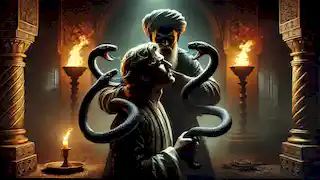
The Reign of Terror
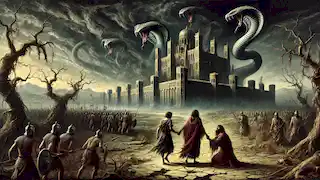
The Revolt of Kaveh the Blacksmith
The Fall of Zahhak
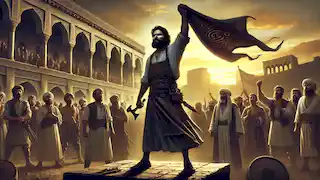
The Legacy of Zahhak
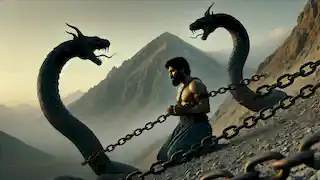
The Story of Zahhak the Serpent King
Reading Time: 8 min
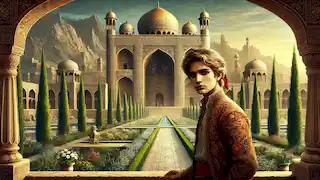
About Story: The Story of Zahhak the Serpent King is a Myth Stories from iran set in the Ancient Stories. This Dramatic Stories tale explores themes of Good vs. Evil Stories and is suitable for All Ages Stories. It offers Moral Stories insights. A dark legend of ambition, betrayal, and the fight for freedom in ancient Persia.

















